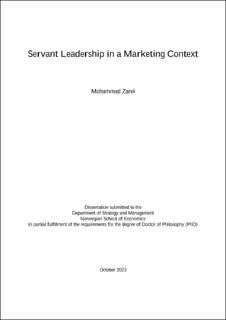Servant Leadership in a Marketing Context
Doctoral thesis
Permanent lenke
https://hdl.handle.net/11250/3124060Utgivelsesdato
2024-03Metadata
Vis full innførselSamlinger
Sammendrag
Research on Servant Leadership (SL) is gaining momentum in the management
literature, but the role and effects of this style of leadership have not received much
attention in the marketing literature. The purpose of this PhD thesis was, in three
interconnected studies, to first investigate the foundations of SL, second, to review
previous research on SL in the marketing literature, and third, to start exploring one of
the promising avenues for future research by testing effects of SL on marketing
creativity.
The first study was the first in-depth citation analysis of SL research, using
24,030 references from the Web of Science spanning a period of 50 years. The
analyses revealed eight distinct streams of research on SL, which emerged at different
points in time, but have continued to coexist. The results provided first-hand insights
into how the field evolved, where it is heading and how to advance future research.
The second study filled a gap in the marketing literature by conducting the first
systematic literature review of the effects of SL on marketing outcomes, reviewing
publications from 228 marketing-indexed journals over the past 52 years. One key
conclusion was that SL seems to be more conducive to creativity in marketing
organizations than other common styles of leadership, though empirical evidence was
lacking.
In the third study, the comparative effects on creativity of four leadership styles
(incl. SL) were tested in an experimental setting, using a sample of 526 marketing
professionals. In line with the propositions, it was found that SL led to higher levels of
marketing creativity in the followers, and this effect was mediated by psychological
safety.
